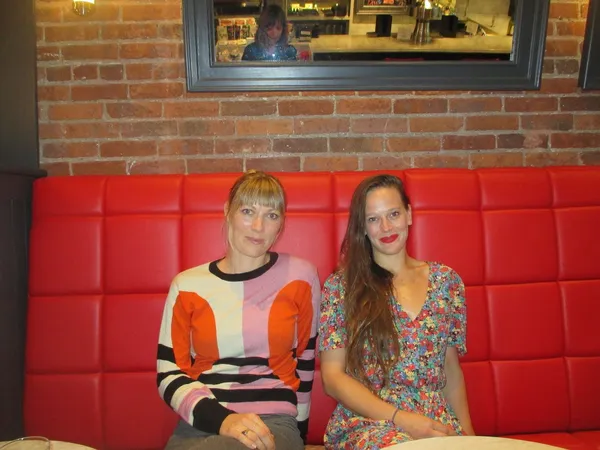 |
| Elvira Lind and Bobbi Jene Smith with Anne-Katrin Titze at the Quad Bar Photo: Anne-Katrin Titze |
From Iowa to Tel Aviv via Juilliard in New York City - dancer and choreographer Bobbi Jene Smith, star of Elvira Lind's deeply compelling and senses-provoking documentary, has been no stranger to travel, inward and outward. The filmmaker, with remarkable access, based clearly on enormous trust by her subject, followed Bobbi over a period of three years during a phase of great decision making.
After having been a dancer in the internationally celebrated Batsheva Dance Company - led by Ohad Naharin, her former lover - and having lived in Israel for 9 years since she was 21, Bobbi decides that the time has come for her to return to the US. Naharin, who developed the movement language called Gaga and pushed the boundaries of contemporary dance, taught Bobbi about "pleasure and pain." He knows she had to get away from him to grow. A fledgeling tree is the one that needs a bamboo stick to hold it up against the winds.
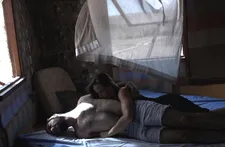 |
| Bobbi Jene Smith with Or Schraiber: "One of the reasons is that we talked a lot about how do we explain when people are in love." |
There is an obstacle to her leaving her life in Israel. Or Schraiber, the man she loves, a dancer in the company, 10 years younger than Bobbi, is close to his family and cannot imagine leaving the country of his birth. While we get to peek into their life as a couple together and long distance, a second strand of the narrative concerns the development of a piece Bobbi calls Study on Effort. At times the two are so intertwined that you might wonder where the private begins and the choreography ends and vice versa.
This is a film of small points that can either pounce right to your solar plexus or open up importance slowly, like oysters releasing the pearls of wisdom with measure.
Bobbi and Elvira joined me at the Quad Bar inside the Quad Cinema for a conversation on what the idea of effort means, the metaphor of objects, "making yourself vanish" as a filmmaker, sensory overload, abstractions and love, the balance between home and exile, the significance of Arrowed with Oscar Isaac, and "finding, picking out, those little moments where no one seems to be too aware of themselves."
Anne-Katrin Titze: First of all, congratulations on this beautiful film and also your baby. I was at the Tribeca Awards ceremony, and there was your message to us.
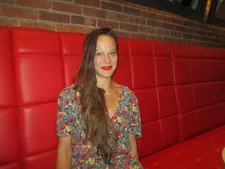 |
| Bobbi Jene Smith: "I can get really excited about the most simple thing." Photo: Anne-Katrin Titze |
Elvira Lind: Thank you. That was a crazy sort of coincidence. Everything just happened at the same time.
AKT: I would like to start with effort. Because the film made me think about what we consider effort and the stigma, surrounding the idea of effort. It's split - on the one hand, of course, people say, yeah, you have to put effort into things. On the other hand, there is the goal of effortlessness. It is a central point in both your performance piece, and in your film. Can you talk about effort?
Bobbi Jene Smith: Actually, I think sometimes as I dig more into this idea of effort and what it means and how it's seen and what we give more value to and less value to - and it's been interesting to me to see that sometimes the greatest efforts are the ones that aren't seen. Or the ones that seem effortless, that aren't loud or big - they might be very gentle and seem very easy - but those sometimes have the largest amount of effort in them.
AKT: Very true.
BJS: And it's not so much about showing how difficult something is, it's just about being true to the action or the moment.
AKT: Elvira, any thoughts on effort?
EL: It's just that it's so beautiful what you [Bobbi] just said and it's so true. That's the big challenge often when you make a movie. To make my effort disappear. And I think that that's one of the obstacles when you film. That you have to make yourself vanish. And the effort of seeing while not being seen - that can be challenging. So that when people watch the film, they don't see the efforts that go on behind.
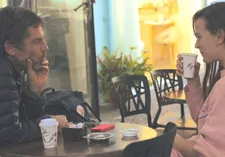 |
| Batsheva Dance Company Artistic Director Ohad Naharin with Bobbi Jene |
AKT: People might think it's pure chance, the things that you get and clearly it isn't. I am thinking for example of the little moment when Ohad [Naharin] is picking something, a morsel, off your plate. You captured a gesture so telling because it shows the intimacy the two of you have [in this scene, Bobbi tells Ohad that she is leaving the Batsheva Dance Company and Israel]. And also you, as the filmmaker, being allowed to capture that.
EL: Lots of people don't think about these micro things that they do. Or, sometimes the things that are most vulnerable or most revealing are something that we don't know. So we often hide other things and they are the ones that are actually most telling about ourselves. And therefore those things can also be more true and honest. So you capture a lot when you film the way I do. I just film and film and film.
And actually half the challenge is in the editing. Finding, picking out, those little moments where no one seems to be too aware of themselves. We do these little things, which causes a reaction and you have to pay such attention to detail. That's a very big part of the filmmaking journey.
AKT: It's a film that surprised me. It surprised me how much I was, after seeing it, thinking about abstractions.
Bobbi is giving me a big thumbs up and a wide, happy grin.
AKT: Can you put this into words? Okay, for example, our relationship to objects. The moment with the chairs is another great one that I loved. When the chair is rescued from the sea, from the water.
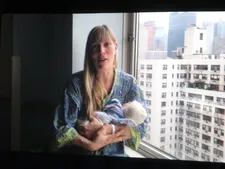 |
| Elvira Lind: "And the effort of seeing while not being seen - that can be challenging." Photo: Anne-Katrin Titze |
BJS: I mean, I think that I see a lot of objects. I think it's kind of just how I see the world, that I can get really excited about the most simple thing. Like the idea of a door. If I become crazy about it I can look at a doorknob and start crying. Because it's like, if you turn this, it will open up into another space. Just even that metaphor.
Or two sticks leaning against each other - it could excite me and turn me on in ways I can't even explain. Just because two things leaning up against each other - if one leans too much, the other will fall. If one supports too much, the other one will fall.
AKT: You're a philosopher!
BJS: No, and like with the chair, it's like, one chair was caught out there by itself. It kills me.
EL: I think that is my favourite moment in the movie. One of the reasons is that we talked a lot about how do we explain when people are in love. How do we know when we see it? And it's with the things that you do. I mean, people can say a bunch of stuff, but how do we know before they might even know? This is someone really in love with this other person? And that is the best example I've seen, I think.
There were so many ways to explain it, they had so many intimate conversations together. But this? With one person suddenly wanting this chair to come in from the waves and then him wanting to save it for her - because you're not going to do that unless you really, really...
BJS: Even if he doesn't understand the metaphor at all.
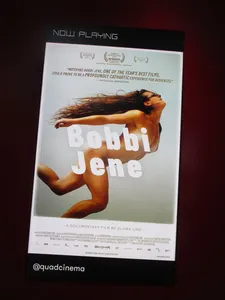 |
| Bobbi Jene poster at the Quad Cinema Photo: Anne-Katrin Titze |
EL: Exactly! He just could see that she wanted this chair saved. And this chair was going to be saved. I loved editing that scene!
AKT: It is one of my favourites. There is a folktale in the Grimms' collection, called Freddy and Katy. I don't know if it ever crossed your path? It's a tale about a couple and she multitasks and causes lots of chaos. She also has this thing that she cannot distinguish between inanimate objects and living beings. So she is putting butter on the road because the poor road is suffering.
BJS: Oh, amazing.
AKT: She carries a door on her back and hangs a bottle of vinegar on the door and then says, "Oh, let the door carry the vinegar." And she rolls cheese down the hill to go fetch the other cheese that she dropped before.
BJS: That sounds very familiar. I've got to read that! [Bobbi takes out a notebook and writes down the title].
Bobbi Jene is in cinemas in the US and will have its UK premiere next month in the London Film Festival.
Coming up - Elvira Lind and Bobbi Jene Smith on how they met, Arrowed with Oscar Isaac, the story always being first, the smelling thing, sensory overload, editor Adam Nielsen, the balance between home and exile, Laura Dern and how we see women, and the possibility that home is "only the place you miss."





















